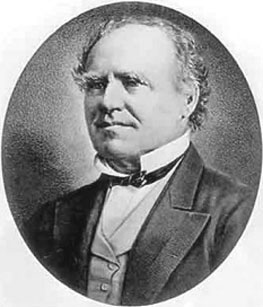 |
| Joseph Howe was an outspoken advocate for responsible government. |
The Seven Years’ War is raging. The fortress of Louisbourg has fallen and is now in British hands. The expulsion of the Acadians from their native lands, begun three years earlier, is still ongoing.
The year is 1758, and democracy’s roots in Nova Scotia are about to take shape.
Nova Scotia‚Äôs first try at representative government was a far cry from our Legislative Assembly today, but it was an important step towards a government in which the voting public ultimately controls the business of government. Its inception is being marked this year by the Government of Nova Scotia‚Äôs ‚ÄúDemocracy 250‚ÄĚ initiative, which aims to shed light on the province‚Äôs long history towards democracy.
What might be most surprising about that history is that the first representative government in the colony was not only welcomed by the British, it was actually their idea.
‚ÄúWe tend to think of the British Empire as the retrograde, reactive force against the colonies that push for change,‚ÄĚ explains Jerry Bannister, an associate professor in the Department of History who specializes in Canadian and Atlantic Canadian history. ‚ÄúIn this instance, it‚Äôs the Imperial authorities who are saying, ‚ÄėWe‚Äôd prefer that you have representative government.‚Äô And it‚Äôs Charles Lawrence, the Lieutenant Governor, who doesn‚Äôt want it.‚ÄĚ
Attracting settlers
The British government was desperate to attract new settlers to Nova Scotia to take up the land vacated by deported Acadian farmers. Their target market: New England, to communities of settlers looking for new land on which to farm. The catch: the settlers weren’t going to come without a guarantee that they would have comparable civil rights to those in the American colonies. Paramount was some basic form of representative government, which is why in 1758 the British established the first House of Assembly in the colony.
‚ÄúIt was not something that Lawrence wanted because, already, New Englanders had a certain reputation for political unreliability from the Imperial perspective,‚ÄĚ adds David Sutherland, a fellow expert in Atlantic Canadian history who is now retired from the Department of History. ‚ÄúBut the settlers came cheap, and they came with experience in frontier conditions. They were nearby and they were motivated to come.‚ÄĚ
‚ÄúAnd that changes the ethnic map of Nova Scotia forever,‚ÄĚ adds Dr. Bannister. ‚ÄúBy the eve of the American Revolutionary war, most of the people living in Nova Scotia are either directly or one-step removed from being New Englanders. I think you can still see the effects today.‚ÄĚ
A few features of Nova Scotia’s first House of Assembly would seem quite familiar to residents of the 21st century. The assembly’s primary concerns were the sort of local politics that still hold court today: taxation, economic subsidies for key industries, the building of roads and bridges. And historical records note significant tension between representatives from Halifax and those from the colony’s rural regions.
Democratic democracy?
That‚Äôs about where the similarities end, though. The franchise to vote was restricted to property-owning males of Protestant descent, effectively cutting off women, Catholic, African and Native Canadians from the political process. The ‚Äúlocal notables‚ÄĚ chosen to serve were selected in town hall meetings often fuelled by faction feuds and gang-like intimidation. And if you think politicians don‚Äôt work very often today, consider this: the first House of Assembly only gathered once a year.
The biggest difference, though, is that while the British had granted Nova Scotia a form of representative government, it was a far cry from responsible government. The ruling forces ‚Äď the Lieutenant Governor, the executive branch ‚Äď were still appointed by Britain without any say from the colonists themselves. The House of Assembly existed to allow the colonists a voice in questions of revenue and taxation, but granted them little actual power.
Still, it was a start towards a more robust democracy. ‚ÄúRepresentative government is something which is organic and changes,‚ÄĚ says Dr. Sutherland. ‚ÄúSo by the 1790s, the Loyalists bring with them another wave of American-inspired ideals and customs and begin to work against the entrenched oligarchy in the system. The long-term effect is that the House of Assembly becomes more effective in articulating the argument that it should be a major player. That‚Äôs still well short of the concept that the people who win an election should have complete control over the executive branch; that‚Äôs the argument that starts to be made in the 1840s with Joseph Howe and the responsible government movement.‚ÄĚ
An independent judiciary
Philip Girard, a legal historian who teaches in the Faculty of Law, is writing an essay for the Democracy 250 project on the evolution of an independent judiciary ‚Äď another key democratic principle. He agrees that it‚Äôs important to view democracy‚Äôs history as a journey, not a destination.
‚ÄúJudicial independence had only just caught on in England at the time of colonial government, and the colony‚Äôs first chief justice served ‚Äėat pleasure‚Äô of the government ‚Äď they could be removed at any time,‚ÄĚ he explains. ‚ÄúThe idea that judges should be independent of the government of the day is a slow growth that takes place, really, over 250 years.‚ÄĚ
‚ÄúDemocracy is not a static end point ‚Äď it‚Äôs a process,‚ÄĚ concludes Dr. Bannister. ‚Äú1758 is merely the start of democracy in Nova Scotia, on an important path that leads through 1848 and through to today.‚Ä̬†
